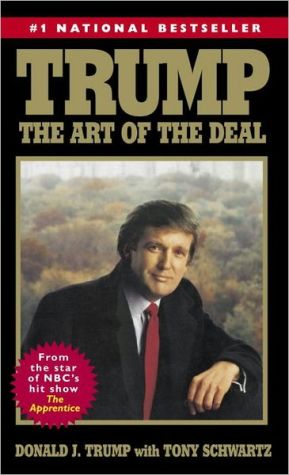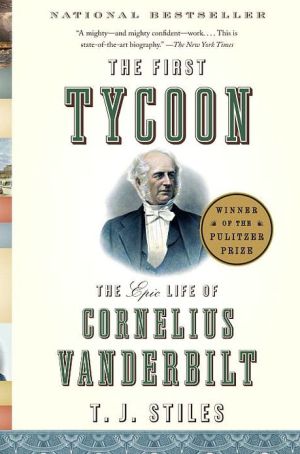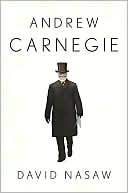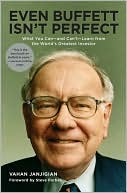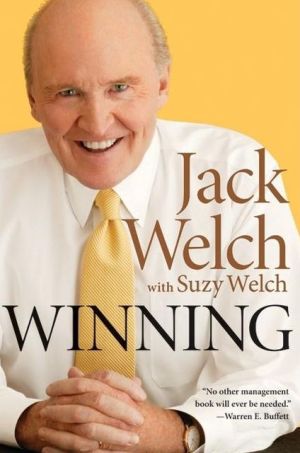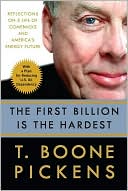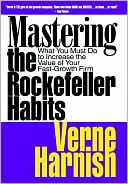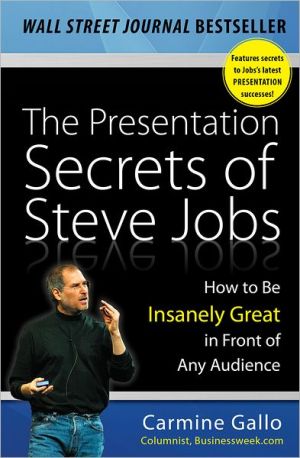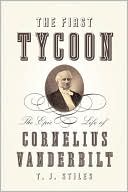Trump: The Art of the Deal
From the Impresario of NBC’s hit show The Apprentice\ TRUMP ON TRUMP: “I like thinking big. I always have. To me it’s very simple: if you’re going to be thinking anyway, you might as well think big.”\ And here’s how he does it: the art of the deal.\ Beginning with a week in Trump’s high-stakes life, Trump: The Art of the Deal gives us Trump in action. We see just how he operates day to day—how he runs his business and how he runs his life—as he chats with friends and family, clashes with...
Search in google:
From the Impresario of NBC’s hit show The ApprenticeTRUMP ON TRUMP: “I like thinking big. I always have. To me it’s very simple: if you’re going to be thinking anyway, you might as well think big.”And here’s how he does it: the art of the deal.Beginning with a week in Trump’s high-stakes life, Trump: The Art of the Deal gives us Trump in action. We see just how he operates day to day—how he runs his business and how he runs his life—as he chats with friends and family, clashes with enemies, efficiently buys up Atlantic City’s top casinos, changes the face of the New York City skyline . . . and plans the tallest building in the world.TRUMP ON TRUMP: “I play it very loose. I don’t carry a briefcase. I try not to schedule too many meetings. I leave my door open. . . . I prefer to come to work each day and just see what develops.”Even a maverick plays by rules, and here Trump formulates his own eleven guidelines for success. He isolates the common elements in his greatest deals; he shatters myths (“You don’t necessarily need the best location. What you need is the best deal”); he names names, spells out the zeros, and fully reveals the deal-maker’s art: from the abandoned property that became the Jacob K. Javits Convention Center to the seedy hotel that became the Grand Hyatt; from the race to rebuild Central Park’s Wollman Skating Rink to the byzantine saga of the property that became Trump Tower. And throughout, Trump talks—really talks—about how he doesit.TRUMP ON TRUMP: “I always go into a deal anticipating the worst. If you plan for the worst—if you can live with the worst—the good will always take care of itself.”Donald Trump is blunt, brash, surprisingly old-fashioned in spots—and always, always an original. Trump: The Art of the Deal is an unguarded look at the mind of a brilliant entrepreneur and an unprecedented education in the art of the deal. It’s the most streetwise business book there is—and a sizzling read for anyone interested in money and success. Publishers Weekly This boastful, boyishly disarming, thoroughly engaging personal history offers an inside look at aspects of financing, development and construction in big-time New York real estate. ``I don't do it for the money,'' maintains Trump, the son of a Queens realtor who, at age 27, bought and transfigured the colossal Hotel Commodore at Grand Central Terminal. Now 40, he has built, among other projects, and owns outright, Fifth Avenue's retail and residential Trump Tower (where he occupies a double-triplex suite); owns and operates Trump's Castle, a casino in Atlantic City; is arguably the most visible young man on Manhattan's celebrity circuit (``Governor Cuomo calls. . . . dinner at St. Patrick's Cathedral. . . . I call back Judith Krantz''); and is currently developing a controversial 100-acre West Side ``Television City'' project that is planned to include the world's tallest building. For those who would do likewise, Trump articulates his secrets for success: imagination, persistence, skill at ``juggling provisional commitments'' (e.g., for land or lease options, bank financing, zoning approval, tax abatement, etc.) and most crucial of all, a true trader's instinct. 135,000 printing; first serial to New York magazine and Vanity Fair; Fortune Book Club main selection; BOMC alternate. (December 14)
Trump\ The Art of the Deal \ \ By Donald J. Trump \ Warner Books\ Copyright © 1989 Donald J. Trump\ All right reserved. \ ISBN: 0446353256 \ \ \ \ Chapter One\ Be a General\ I am the chairman and president of The Trump Organization. I like saying that because it means a great deal to me. There are almost twenty thousand members of this organization at this point. I did a print ad once in which I declared, "I only work with the best." That statement still stands.\ More and more, I see that running a business is like being a general. Calling the shots carries a great deal of responsibility, not only for yourself, but for your troops. Your employees' lives, to a large extent, are dependent on you and your decisions. Bad strategy can end up affecting a lot of people. This is where being a leader takes on a new dimension. Every decision you make is an important one, whether there are twenty thousand people working for you or just one.\ If you are careful when finding employees, management becomes a lot easier. I rely on a few key people to keep me informed. They know I trust them, and they do their best to keep that trust intact.\ For example, when I need to know something about my casinos and hotels in Atlantic City, I know I can call up Mark Brown, my CEO, and get a fast and informed answer. If I call Laura Cordovano over at Trump Park Avenue and ask about sales, she'll give it to me exactly as it is. If I call Allen Weisselberg, my CFO, he'll tell me what I need to know in twenty words or less. My senior counsel and Apprentice adviser, George Ross, can do it in ten words or less. Find people who suit your business style and you'll have fewer problems to deal with as time goes on.\ Good people equals good management and good management equals good people. They have to work together or they won't work together for very long. I've seen good management get by with mediocre people, and I've also seen excellent people get stuck in the mires of bad management. The good managers will eventually leave, followed by the good workers, and you will be left with a team that gets along because they're all mediocre. Save yourself time by getting the best people you can. Sometimes this can mean choosing attitude over experience and credentials. Use your creativity to come up with a good mix.\ Creative people rarely need to be motivated-they have their own inner drive that refuses to be bored. They refuse to be complacent. They live on the edge, which is precisely what is needed to be successful and remain successful.\ One of my former employees was in charge of\ a new project. He had done a thorough and ac-\ ceptable job, but I felt that something was missing. It wasn't fantastic, which, knowing his capabili- ties, it should have been. I decided to challenge his creative ego by mentioning that it was fine but seemed to lack inspiration. I politely asked him whether he was genuinely interested in the proj- ect and suggested that perhaps that might be the problem.\ Well, the guy went ballistic on me. He was deeply insulted.\ And, as you can probably guess, the revision he turned in was terrific. The difference between the first draft and the final version was incredible. I didn't slam the guy because he was usually demanding of himself and had never let me down. But I had to give him a jolt.\ Generals motivate their soldiers; they inspire them when it is necessary. They do the same for their highest-ranking officers. We all need a boost now and then. Learn how to tailor your method to the personalities you are managing.\ Keep the big picture in mind while attending to the daily details. This can seem like a balancing act, but it is absolutely necessary for success in running a company.\ \ \ Continues... \ \ \ \ Excerpted from Trump by Donald J. Trump Copyright © 1989 by Donald J. Trump. Excerpted by permission.\ All rights reserved. No part of this excerpt may be reproduced or reprinted without permission in writing from the publisher.\ Excerpts are provided by Dial-A-Book Inc. solely for the personal use of visitors to this web site. \ \
\ Publishers Weekly - Publisher's Weekly\ This boastful, boyishly disarming, thoroughly engaging personal history offers an inside look at aspects of financing, development and construction in big-time New York real estate. ``I don't do it for the money,'' maintains Trump, the son of a Queens realtor who, at age 27, bought and transfigured the colossal Hotel Commodore at Grand Central Terminal. Now 40, he has built, among other projects, and owns outright, Fifth Avenue's retail and residential Trump Tower (where he occupies a double-triplex suite); owns and operates Trump's Castle, a casino in Atlantic City; is arguably the most visible young man on Manhattan's celebrity circuit (``Governor Cuomo calls. . . . dinner at St. Patrick's Cathedral. . . . I call back Judith Krantz''); and is currently developing a controversial 100-acre West Side ``Television City'' project that is planned to include the world's tallest building. For those who would do likewise, Trump articulates his secrets for success: imagination, persistence, skill at ``juggling provisional commitments'' (e.g., for land or lease options, bank financing, zoning approval, tax abatement, etc.) and most crucial of all, a true trader's instinct. 135,000 printing; first serial to New York magazine and Vanity Fair; Fortune Book Club main selection; BOMC alternate. (December 14)\ \ \ \ \ Library JournalThis is a fascinating book because it is incredible. At the age of 41, Trump, the son of a Queens, New York, developer of moderate-income apartment houses, presides over a vast real estate empire with assets in the billions. Trump's world is composed of an endless series of deals and ventures, most of them monumentally successful from his point of view. The book is less an autobiography than an hour-by-hour recapitulation of how Trump spends his time plus a few lessons for those who would do the same. Trump seems to be a clever entrepreneur and exhibitionist. There should be requests aplenty for this. A.J. Anderson, G.S.L.I.S., Simmons Coll., Boston\ \
